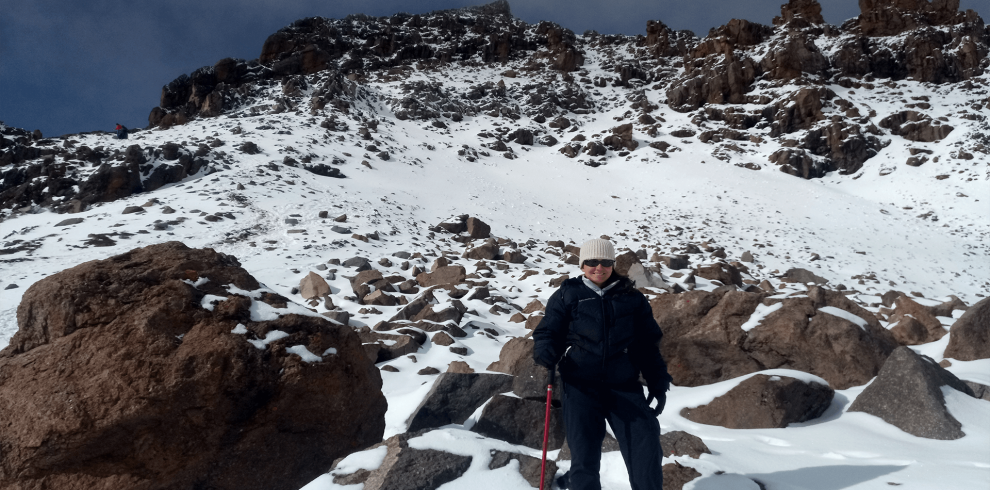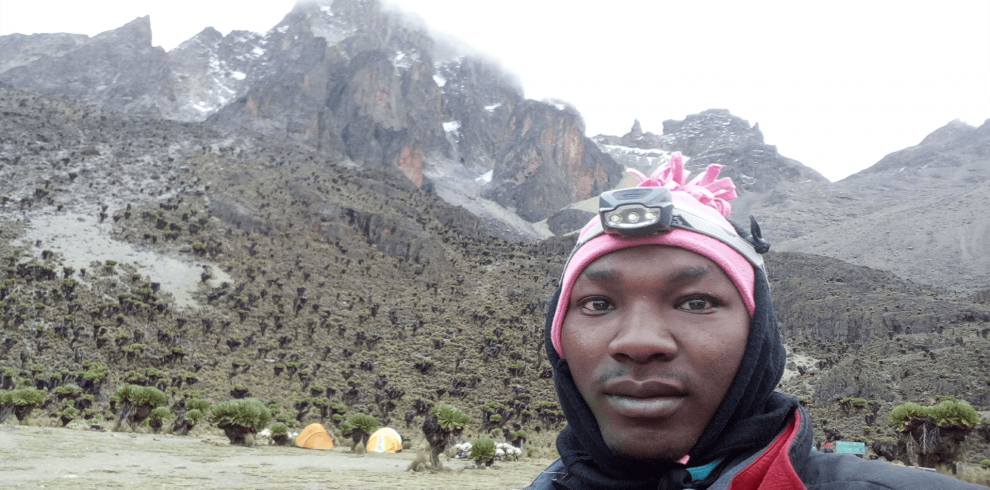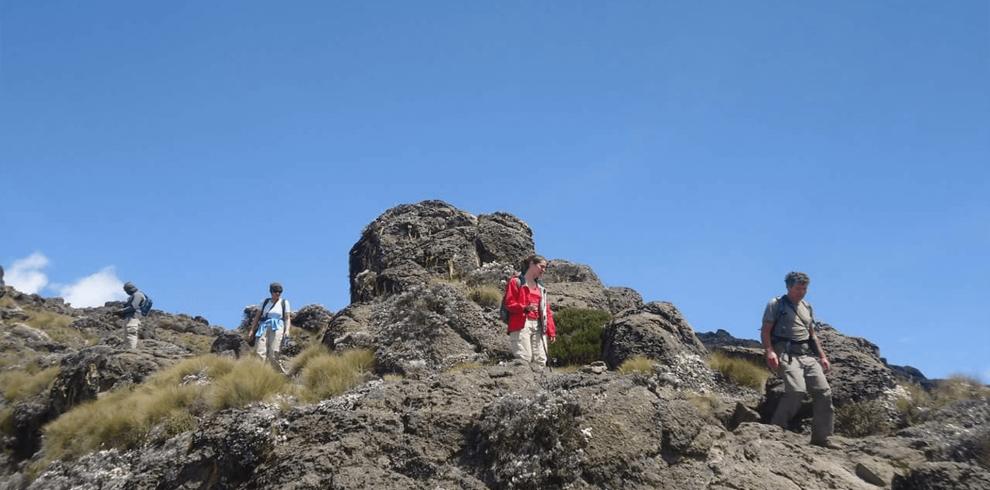9 days chogoria sirimon – Batian Nelion Climb
Techniacal climbing Batian Nelion peak
mount kenya Chogoria Route climbing safaris 5 Days Mount Kenya Climbing, 5 days Mount kenya Chogoria Route, 4 Nights, 4 Days Mount Kenya Climb Chogoria Route down chogoria route, Mount Kenya Climb Chogoria Route – Mount Kenya Hiking: Chogoria route on Mount Kenya Climb Chogoria route Trekking mount Kenya excursions adventures, Lake Ellis, Gergeos valley, Mount kenya bandas, Road head campsite
Techniacal climbing Batian Nelion peak
The Chogoria route is our recommended and arguably the most magnificent ascent route to the summit area. It is the driest route up the mountain and the walk beside the Gorges Valley truly spectacular.
The descent by the Sirimon route takes one through some beautiful forest tracks and completes the traverse of the mountain.
Trip Highlights:
- Traverse the mountain from East to North via the Chogoria and Sirimon routes.
- Climb Point Lenana, the highest trekking peak on Mount Kenya.
- Ascend via the quieter and most dramatic Chogoria route
Tour Description provided by Sirimonroute.com
<p>Arrive in Nairobi and be met at Jomo Kenyatta Airport for arrival formalities. If arriving during the day, you may opt to immediately proceed to Chogoria or alternatively spend the night in Nairobi if arriving in the evening.</p><p></p><p>Overnight: Fairview Hotel</p><p>Meal plan: Bed & breakfast</p>
<p>Morning departure from Nairobi and drive for 3 and half hours to Chogoria. On arrival in Chogoria town, drive further in a 4x4 vehicle half way to Chogoria Park Gate. Descend from vehicle and have a guided walk for 2 hrs to the main Chogoria Park gate. The walk will be through the bamboo forest and will be start of your acclimatising hike.</p>
<p>After breakfast you will walk for 3- 4 hrs to Lake Ellis where you relax for lunch. Lunch is followed by a walk to Mugii hill; if the day will be clear superb views on the Eastern side of the mountain are breathtaking.</p>
<p>Early morning leave Mintos hike to Point Lenana 4985 mtrs, then proceed to Shiptons camp for overnight</p>
<p>This day could be used as your rest day or could also be used to walk to the climbing base where we meet the technical guide. You will then have a small briefing of the climb and have some time to sort out rock climbing equipment.</p>
<p>Proceed to the base of the climb and start rock climbing by the north face standard route starting early in the morning with breaks for meals.</p>
9 DAYS CHOGORIA SIRIMON ROUTE
- - All transportation to/from the mountain (private)
- - All Park fees.
- - All food while on the Mountain.
- - Accommodation in mountain huts/ camping where applicable.
- - All guiding services
- - Porter support for the climb
9 DAYS CHOGORIA SIRIMON ROUTE
- Personal clothing and equipment
- Tips and gratuities for guides and porter (recommended to be 10 - 15% of climb costs)
- Beverages while not on the mountain
Absolutely not. Trekking Mount Kenya is a hiking experience for most people and, for a rare few who wish to do technical climbing, this can be arranged. If you can hike 10-15 km (6-12 mi) with an elevation gain then you can do this trip. The terrain is mostly dirt trail and occasionally scree.
You are responsible for bringing:
•warm clothing: see “What clothing should I bring?”
•appropriate hiking footwear
•backpack
•first aid kit (tylenol/paracetamol, medical tape, gauze, blister kit, cold medication, anti-diarrheal agent, gravol, etc – this is not a complete list!)
•toiletries: toothbrush, toothpaste, deodorant, razor, toilet paper, soap, sanitary napkins etc.
•sunscreen, sunglasses and a hat.
•binoculars
•climbing gear (for those of you intend to do technical climbing)
•water bottles and water filtering/purification system
You may choose to bring your own:
•sleeping bag
•thermarest (or equivalent)
•we can provide a sleeping bag for you if need be and the huts have well-loved foam matresses.
You do not need to bring:
•food – we bring lots
•cooking stove and fuel – we’ve got that covered
•cooking utensils, plates
What clothing should I bring?
This is not an exhaustive list but here are our suggestions.
Upper Body
inner layer: polypropylene long underwear with good wicking ability.
middle layer: fleece and/or soft shell
outer later: Gore-tex shell
Depending on the time of year you may consider bringing a down jacket.
fleece hat and fleece gloves
shell gloves
two T-shirts
Lower Body:
inner layer: polypropylene long underwear with good wicking ability.
middle layer: fleece pants
outer later: Gore-tex or other shell
bring shorts also – conditions are highly variable
Feet:
two pairs of thin polypropylene socks and two pairs of wool
or synthetic hiking socks
hiking boots
gaiters are nice but not a necessity
Naturally, dysentery is not high on our list of things that we want our customers to experience. Therefore, we strongly advise that you do not drink the stream water directly even though it is glacial fed. You can bring along any number of water purification systems available from outdoor shops. These can be filter/iodination systems (like those available from Katadyn, or MSR) or just chlorine purification drops (eg Pristine).
Only if you plan to do technical climbing.
Generally, you carry a pack but the heaviest packs are carried by our porters. You cannot expect us to act as your sherpas but you will not have to carry the heaviest of the packs – unless, of course, you want to for some reason.
For Mount Kenya treks the base price includes:
•transportation
•all meals
•accomodation (ie the huts)
•sleeping bag if needed
For Mount Kilimanjaro, because the park fees are structured differently, the camping fees are part of the park fees and are not included in the base price. See the pricing page for an explanation.
Are park fees included in the base price?
No. You will have to pay the park entrance fees which are reasonable for Mount Kenya and sort-of-outrageous for Mount Kilimanjaro.
Mount Kenya Prices park fees are:
$56 for adult non-residents for the per day
The pricing page gives more details.
can you still guide me?
Yes – we can arrange for you to have assitance from a local climber with experience on the most easy and difficult faces on the mountain. We do need to know this ahead of time and there will be extra fees associated with this that we can negotiate with you. We don’t set standard extra fees for technical climbers because each climber wants to arrange something unique and we determine the cost accordingly.
Altitude sickness, also known as mountain sickness is always a possibility and can put quite a damper on a trekker’s experience. Typically, mountain sickness is manifested by headache, nausea and vomitting but can lead to very dangerous pulmonary and cerebral edema. The chance of getting mountain sickness decreases when the climber has ascended slowly or has had thorough acclimatization with each elevation gain. It is not recommended to do the trek immediately upon arrival to Kenya. Acclimitization with a few days at Nairobi’s 5300 ft elevation is preferable. The only cure for mountain sickness is descent and we will descend with any trekker about whom we are concerned. Should you choose to use acetazolamide to prevent mountain sickness, you would have to arrange this with your physician. We will not provide you with this prescription medication.
No – we have done this trek hundreds of times. We know our way. If you want to bring these tools for your own benefit, you may do so.
You are going to see plants like you have never seen anywhere. Have a look in the photos! The Kenyan Wildlife Service gives a nice description of wildlife here. Definitely, the most common animal for you to see will be the rock hyrax. These are impertinent little creatures of a comically unfriendly temperment. This does not mean that they are unwilling to mooch your food. They are mooches. They are a very interesting animal that you will not likely see elsewhere in such abundance. Fortunately, the Mt Kenya variety do not make that ear-splitting scream that the tree hyraxes of the Masai Mara do!
See the Contact Us page.
We are a small independent operation owned by Kenyan nationals. For this reason, at this time, we can only accept cash payment.
the most important thing is that you are physically fit. If you excercise regularly then you should be able to accomplish the trek without difficulty. You should be able to carry a pack while you hike but you will not be loaded down like a burrow. If you have done all-day hikes in the past then you will be able to do this. if I am not an experienced trekker?




